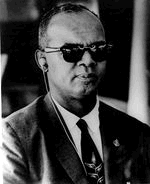Historian, educator, and politician Eric Eustace Williams was born in 1911 in Port of Spain, Trinidad, to working class parents. His family’s struggles to survive economically introduced Williams to the brutal social and racial hierarchy of the British colony. As an adult, he gave up a faculty position at Howard University to return to his homeland, eventually becoming its prime minister.
Williams’ childhood coincided with the development of a nascent black working-class consciousness as figures such as Marcus Garvey spoke out against institutionalized racism and imperialism and offered radical solutions. He studied at Queen’s Royal College in Port of Spain before winning a scholarship to study in England at Oxford University where he earned a BA with honors in history in 1935. Three years later, he earned his PhD there, also with honors. During this period of international tension just before the outbreak of World War II, Williams experienced racism in Britain and Europe. His doctoral thesis, The Economic Aspects of the Abolition of the Slave Trade and West Indian Slavery, argued against the notion that humanitarian and moral concerns gave rise to the abolitionist movement in Europe. Rather, Williams claimed economic and strategic concerns were at the heart of abolitionism in Britain and elsewhere. A similar argument was espoused by C.L.R. James whose seminal work, The Black Jacobins, was published that same year and influenced Williams’ thinking.
Despite his academic successes, Williams was unable to find a teaching position in Great Britain and in 1939 joined the faculty of Howard University in Washington, D.C. He published Capitalism and Slavery in 1944, arguing that the British abolition of slavery grew from the realization that wage labor had supplanted slave labor in the global capitalist marketplace. His other major works include History of the People of Trinidad and Tobago (1962) and British Historians and the West Indies (1964).
Williams returned to the Caribbean in 1952 where he became involved in decolonization politics. He held open-air lectures for working-class people and spoke as a West Indian nationalist dedicated to ending imperialism in his region. In 1956 Williams helped found People’s National Movement, Trinidad and Tobago’s first modern political party, and became deeply-involved in the nation’s political life after independence in 1962. Williams held numerous offices in the Trinidad and Tobago government, serving as Prime Minister from 1962 to 1981. Eric Williams died while in office on March 29, 1981, in Port of Spain.

